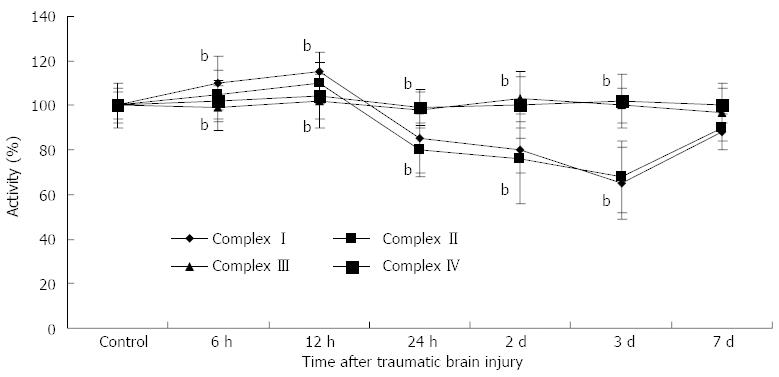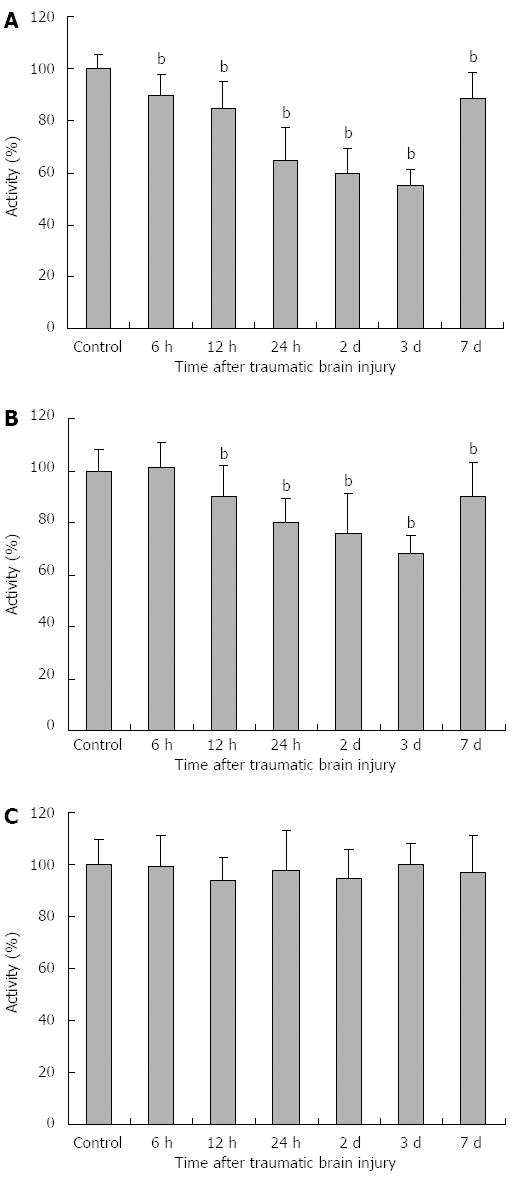Copyright
©2014 Baishideng Publishing Group Inc.
World J Gastroenterol. Jul 28, 2014; 20(28): 9585-9591
Published online Jul 28, 2014. doi: 10.3748/wjg.v20.i28.9585
Published online Jul 28, 2014. doi: 10.3748/wjg.v20.i28.9585
Figure 1 Activities of rat enterocyte mitochondrial complex I-IV after traumatic brain injury.
Activities of mitochondrial complex I (6 h: 110 ± 10, 12 h: 115 ± 12, 24 h: 85 ± 9, day 2: 80 ± 15, day 3: 65 ± 16) and complex II (6 h: 105 ± 8, 12 h: 110 ± 92, 24 h: 80 ± 10, day 2: 76 ± 8, day 3: 68 ± 12) increased at 6 h and 12 h following traumatic brain injury, and then significantly decreased at 24 h, day 2 and day 3, respectively, and compared with the control group. There were no differences in complex III and IV activities between the control and TBI groups. bP < 0.01 vs control group.
Figure 2 Activities of rat enterocyte mitochondrial related enzymes after traumatic brain injury.
A: Pyruvate dehydrogenase (PDH) activity was significantly decreased at 6 h and continued up to 7 d after TBI compared with the control group (6 h: 90 ± 8, 12 h: 85 ± 10, 24 h: 65 ± 12, day 2: 60 ± 9, day 3: 55 ± 6, day 7: 88 ± 11). The minimum PDH activity was seen at day 3; B: The changes in α-ketoglutaric dehydrogenase (KGDH) activity were similar to those of PDH, except that the decrease in KGDH activity began at 12 h (12 h: 90 ± 12, 24 h: 80 ± 9, day 2: 76 ± 15, day 3: 68 ± 7, day 7: 90 ± 13); C: No significant change in malate dehydrogenase (MDH) activity was observed. bP < 0.01 vs control group.
- Citation: Zhu KJ, Huang H, Chu H, Yu H, Zhang SM. Alterations in enterocyte mitochondrial respiratory function and enzyme activities in gastrointestinal dysfunction following brain injury. World J Gastroenterol 2014; 20(28): 9585-9591
- URL: https://www.wjgnet.com/1007-9327/full/v20/i28/9585.htm
- DOI: https://dx.doi.org/10.3748/wjg.v20.i28.9585










